|
|
|
Sort Order |
|
|
|
Items / Page
|
|
|
|
|
|
|
| Srl | Item |
| 1 |
ID:
191018
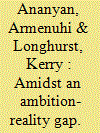

|
|
|
|
|
| Summary/Abstract |
Since 2000, the United Nations’ Women, Peace and Security (WPS) Agenda has addressed the causes and consequences of sexual violence towards women in conflict scenarios. After two decades of effort, an ambition-reality gap persists. Uneven commitments from UN member states, ongoing instances of conflict-related sexual violence around the globe and the lack of a critical mass of female participants in peace negotiations, security policy and politics in general, suggest that WPS has had limited effects. Despite its under-achievements, WPS objectives remain relevant, especially considering the amplifying effects that the Covid-19 pandemic and its fallout have had for gender inequality and conflict.
|
|
|
|
|
|
|
|
|
|
|
|
|
|
|
|
| 2 |
ID:
159777


|
|
|
|
|
| Summary/Abstract |
In 2000, the United Nations (UN) launched the Women, Peace and Security (WPS) agenda by adopting Security Council Resolution 1325. The agenda, among other things, called for the greater inclusion of women in peace negotiation practices and structures. While the European Union (EU) has made commitments to implementing the WPS agenda, the literature has not yet captured the institutional dynamics of the EU as it seeks to translate the WPS agenda into reality. This article takes stock of this hitherto excluded area of research. It argues that mediation is the ‘Cinderella’ of the EU’s peace and security institution because it has been ignored as a site for the implementation of the WPS agenda with important implications. Using a feminist institutionalist framework, the article shows the ways in which institutional practices of change aimed at including the new perspectives prompted by the WPS agenda lead to unintended gendered consequences.
|
|
|
|
|
|
|
|
|
|
|
|
|
|
|
|
| 3 |
ID:
185249
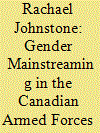

|
|
|
|
|
| Summary/Abstract |
This article uses the Canadian military’s gender-mainstreaming strategy—gender-based analysis plus (or GBA+)—as a case study to explore the implementation of gender mainstreaming in militaries. Utilizing a mixed method approach, including group interviews and surveys, we employ Jahan’s model of gender mainstreaming to understand how GBA+ has been operationalized. We argue that the implementation of GBA+ in the Defense Force constitutes a more superficial integrationist approach to the implementation of gender mainstreaming rather than a transformative, agenda-setting approach, despite the internalization of messaging to the contrary by many in the Canadian Armed Forces (CAF) and the Department of National Defence (DND). While not ideal, we suggest that an integrationist approach does not necessarily mean a GBA+ agenda will fail in a male-dominated organization like the CAF; rather, we contend that it could constitute a valuable starting point for progressive, large-scale change.
|
|
|
|
|
|
|
|
|
|
|
|
|
|
|
|
| 4 |
ID:
130484
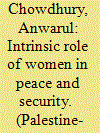

|
|
|
|
|
| Publication |
2014.
|
| Summary/Abstract |
International Women's Day in 2000 was an extraordinary day for me, and will remain so for the rest of my life. That day, I had the honor of issuing on behalf of the United Nations Security Council in my capacity as its president a statement that formally brought to global attention the unrecognized, underutilized and undervalued contribution women have been making towards the prevention of wars, peace-building and engaging individuals and societies to live in harmony. The members of the Security Council recognized that peace is inextricably linked with equality between women and men, and affirmed the equal access and full participation of women in power structures and their full involvement in all efforts for peace and security.
|
|
|
|
|
|
|
|
|
|
|
|
|
|
|
|
| 5 |
ID:
130488


|
|
|
|
|
| Publication |
2014.
|
| Summary/Abstract |
For advocates of United Nations Security Council Resolution 1325 on women, peace and security, the 10th anniversary of the resolution in October 2010 2011was no longer an occasion to sing praises to the resolution. We all know that UNSCR 1325 is important. We all know that it is groundbreaking and game-changing. We have heard all of that from the UN, from member states and even from our fellow civil society actors year in and year out in the last 10 years.
What many of us have decided to do was to take stock of where the world is in terms of the actual implementation of the resolution and the push for real commitments and concrete actions - commitments that would not be long on promise but short on implementation. So where are we in terms of actual implementation 10 years on? Members and partners of the Global Network of Women Peacebuilders (GNWP) conducted in-country monitoring of UNSCR 1325's implementation in Afghanistan, Burundi, Canada, the Democratic Republic of Congo, Fiji, Nepal, the Netherlands, the Philippines, Rwanda, Sierra Leone and Uganda, using a set of common indicators they selected and developed.
|
|
|
|
|
|
|
|
|
|
|
|
|
|
|
|
| 6 |
ID:
170262
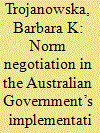

|
|
|
|
|
| Summary/Abstract |
The Australian National Action Plan on Women, Peace and Security (NAP) offers an apt example of norm negotiation in implementing United Nation Security Council Resolution 1325 (UNSCR 1325). Launched in 2012, the NAP is nearing completion due June 2019. The purpose of this article is to understand how far and in what ways the NAP has thus far supported the achievement of the transformative ambitions of the Women, Peace and Security (WPS) agenda to bring about greater gender equality for conflict-affected women. I argue that whilst this transformative agenda failed to diffuse vertically throughout the Australian NAP, this has simultaneously encouraged horizontal diffusion. That is, the sophisticated discourse on gender equality presented in the narrative part of the NAP did not translate into a robust framework for action (vertical diffusion). This failure has, however, allowed the WPS agenda to be negotiated within individual implementing agencies (horizontal diffusion). Through the juxtaposition of policy analysis with semi-structured interviews with NAP implementers, this article demonstrates that the lack of precision around the implementation strategy has—paradoxically—resulted in significant policy development on UNSCR 1325. Simultaneously, it has led to untargeted implementation, ultimately constraining the possibilities for meaningful impact on the ground.
|
|
|
|
|
|
|
|
|
|
|
|
|
|
|
|
| 7 |
ID:
103958
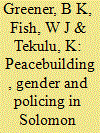

|
|
|
|
|
| Publication |
2011.
|
| Summary/Abstract |
UN Security Council Resolution 1325 calls for a gender perspective to be integrated into the resolution of conflicts. This responsibility manifests itself in a number of more specific proposals, some easily assessable, others less so. In this paper, we begin by considering the success of the Regional Assistance Mission to Solomon Islands (RAMSI) - the poster child for peacebuilding efforts - at meeting these specific proposals. In light of this, we then go on to suggest ways in which RAMSI might meet greater success in fully integrating gender considerations in Solomon Islands by blending sensitivity to gender-based considerations together with a deeper sensitivity to cultural considerations, including cultural understandings of core notions such as 'policing' and 'justice'.
|
|
|
|
|
|
|
|
|
|
|
|
|
|
|
|
| 8 |
ID:
174764
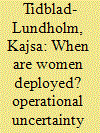

|
|
|
|
|
| Summary/Abstract |
This study explores how the duration of missions affects the participation of women in United Nations (UN) peace operations. I argue that women are less likely to be deployed in the early stages of missions because new missions are associated with high levels of operational uncertainty, which is ultimately a type of risk. Instead, women’s participation will increase over time as the uncertainty decreases and the operating environment becomes more predictable. In an extended analysis, I also explore if the level of gender equality in a troop contributing country affects the decision to deploy women to the early phases of missions. Applying a large-N approach, I study the proportion of women in military contributions to UN peace operations between 2009 and 2015. Using a set of multilevel mixed-effects generalized linear models, the main argument find empirical support. However, when the robustness of the findings is challenged, there is indication that there could be additional factors that affect operational uncertainty and the perceived risk associated with an operating environment. The result of the extended analysis indicate that more gender equal countries are more prone to deploy larger proportions of female military personnel, regardless of when the deployment takes place.
|
|
|
|
|
|
|
|
|
|
|
|
|
|
|
|
| 9 |
ID:
170364
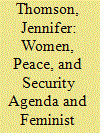

|
|
|
|
|
| Summary/Abstract |
Since the inception of United Nations Security Council Resolution 1325 (UNSCR 1325) in 2000, feminist academia has been closely interested in the developing women, peace, and security (WPS) agenda in international affairs. The majority of this work has emerged from within feminist international relations (Mcleod 2015; Shepherd 2008) and feminist legal studies. Less attention has been paid to the WPS agenda by feminist political science. As a result, less consideration has been given to political institutions within the WPS framework.
|
|
|
|
|
|
|
|
|
|
|
|
|
|
|
|
|
|
|
|
|